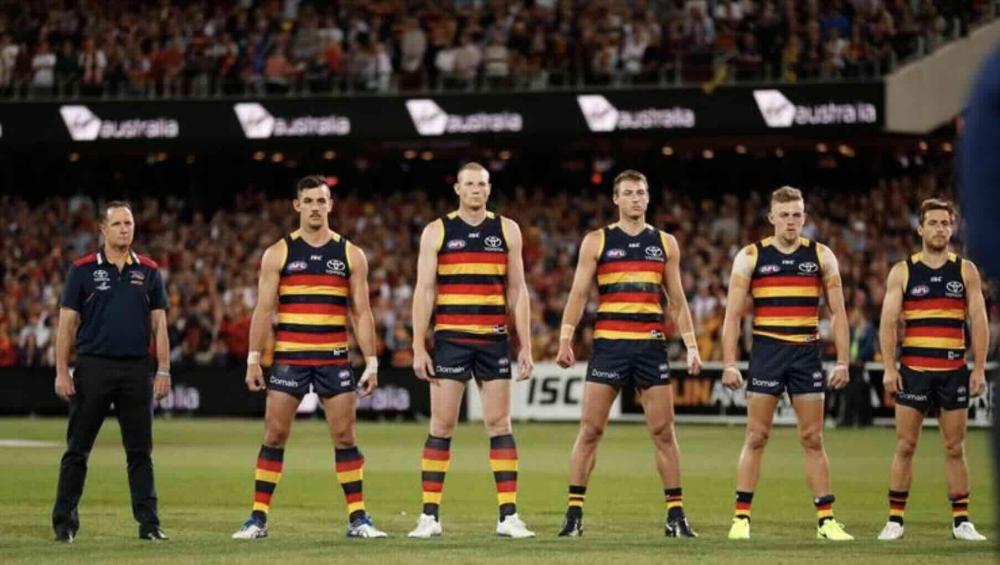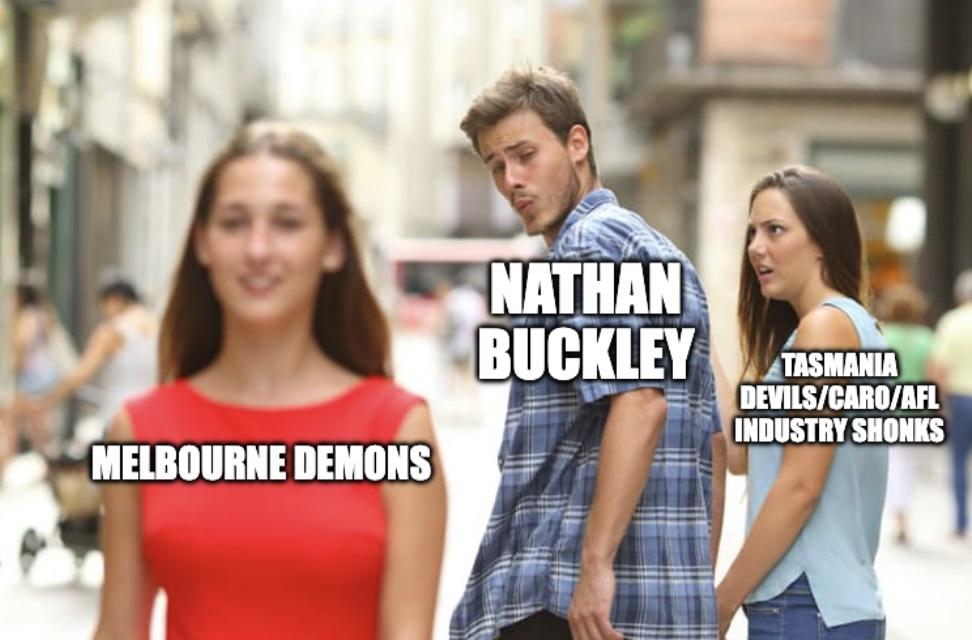Everything posted by Engorged Onion
-
NON-MFC: Finals Week 01
On a Demonland forum, that’d typically be seen as disgraceful…
-
NON-MFC: Finals Week 01
BT froths over Daicos like he’s watching Swan Lake because it’s not really about Nick — it’s anima projection as you said. He’s just spraying his own unmet need for beauty and creativity all over the commentary box. Daicos is the canvas, BT’s mid/late life psyche is the paint. And I’m not even joking.
-
NON-MFC: Finals Week 01
Ahhh.... the Crows’ grand final “power stance”! A very funny moment in history of the sport -depending on the lens you have. Same crew behind that Adelaide camp saga. Honestly, it was less psychology, more “discount men’s retreat with bonus chanting.” Footy clubs get dazzled by hype all the time. The problem isn’t intent — it’s mistaking gimmicks for substance. A power pose might look tough, or 'conected' in theory, but it looked like Year 9 drama class warming up. Anyway good to see they have moved on last night...
-
NON-MFC: Finals Week 01
It's a great narrative post match - and fundamentally flawed. If you're having to intellectualise doing it for someone, whilst you are out there, then you're not 'on task' and present to what's happening.
-
Who Will Be Our Next Coach?
When you take a step back and really look at how the AFL operates, it’s clear it isn’t just about one journalist pushing a line or one club trying to protect itself. The whole thing functions as an ecosystem where media, governance, and legal frameworks overlap in ways that are often invisible to supporters. An AFL media accreditation is a licence to access players, coaches, and inner circles. With that comes subtle but very real pressure: play the game and the doors stay open, push too hard against the grain and access dries up. That dynamic alone explains why certain stories get told loudly while others barely see daylight. Then there’s the legal and governance layer, which is just as tightly interwoven. It’s not unusual to see the same lawyers or compliance people advising the AFL in one capacity and then appearing for clubs or players in another. Think back to the Essendon supplements saga or the Dees under Bailey with tanking...—AFL-appointed lawyers were simultaneously protecting the league’s broader integrity while working directly with the clubs under scrutiny. At board level, individuals often sit across multiple bodies: the AFL Commission, state leagues, even the AFLPA. None of this is hidden, but it does blur the lines of independence. The real purpose isn’t to create transparency—it’s to manage risk! So when Caro comes out with something that feels like an agenda, such as now... it’s worth remembering she isn’t operating in isolation. She’s moving within that ecosystem, one where narratives are constantly shaped, softened, or amplified depending on whose interests are being served. Understanding this doesn’t mean dismissing her or anyone else, but it does show why these stories land the way they do. They’re not just journalistic takes; they’re part of a system designed to protect itself. If we understand that, then our responses can change... The AFL is no longer sport in its purest sense; it’s an entertainment product built on sport. That doesn’t make what happens on the field any less real, but it does explain why the stories, the governance, and the decisions around the game so often feel stage-managed. If we can see it for what it is, we don’t have to be annoyed when agendas surface—we can simply recognise the system at work. For me that awareness probably makes following the game easier, not harder, probably a bit detached and cynical really.. TL/DR The AFL is an ecosystem. Media, governance, and legal structures are interconnected, shaping the way stories are told and decisions are made. Access matters. Journalists rely on accreditation to stay close to players and coaches. That reliance naturally affects which stories get airtime and which fade away. Legal crossover is common. The same advisers often work for the AFL, clubs, and players. It doesn’t mean corruption — it means risk is carefully managed, sometimes at the cost of independence. Narratives are carefully managed. Headlines don’t appear in isolation; they’re part of a bigger pattern where certain interests are protected and others minimised. It’s not the 1980s anymore. Back then, following footy felt more innocent and unfiltered — local clubs, raw stories, fewer layers of spin. Today the game has grown into a full entertainment product, and with that growth has come more orchestration and stage-management. (thanks CHATGPT)
-
Who Will Be Our Next Coach?
I don’t think it’s really about being “sensitive” at all—it’s about recognising the weight that comes when Caro goes public with a view like this. She doesn’t just toss opinions into the ether; she actively reframes the conversation. If she keeps pressing the idea that Buckley belongs in Tasmania, that narrative takes on a sense of inevitability, almost like it’s the noble, legacy-defining path. And that does ripple outward—to boards, sponsors, and AFL decision-makers who are always conscious of how things will be perceived. But when it comes down to Buckley himself. He’s been around the fire long enough to know the noise never stops, and he’s appears to not be the type to be steered by someone else’s headlines... Caro can shape the theatre around the choice, but she doesn’t make the choice for him.... As for those close to Buckley advising him to tread carefully with Melbourne—of course that’s happening. I've made two massive decisions in my life this year and sought council... the future is still unclear. That’s the nature of any high-stakes decision. Friends and colleagues will caution against walking into a club that’s looked fractured for two years.. If not him then I think you’re right—someone like Brendan Lade makes sense. A steadying hand, exposure to different systems, no media storm before he even signs the contract. Sometimes the best choice is the one who arrives without a narrative already written for them... I dont care who we get really, as I dont have the optics on the best candidate thats a fit for where we are at, and the culture within - clearly change was required from an FD perspective, and as inevitable - the playing list too...
-
Who Will Be Our Next Coach?
- Who Will Be Our Next Coach?
a few of these in me... 🍺 stream of consciousness and then constant rewording/reworking...- Who Will Be Our Next Coach?
In my opinion - If you step back from the noisethe Buckley discussion isn’t really about whether he ends up at Melbourne or Tasmania—it’s about what those choices represent in the AFL landscape, and what gets revealed when people like Caroline Wilson start publicly nudging him one way or another. Caroline has always played the role of provocateur and guardian of the game’s bigger picture, and when she makes a point of pushing Buckley towards Tasmania, you have to see the agenda sitting behind it. Tasmania is the AFL’s most fragile project—it’s a political, cultural, and financial gamble. To land someone with Bucley’s name and stature gives it instant credibility, the kind of legitimacy that no PR campaign could buy. She’s talking about Buckley the symbol. For her,its about protecting the long-term integrity of the AFL’s national expansion. Thats her agenda... But here’s the cost. Relationships in footy matter more than people like to admit. Publicly steering Buckley isn’t neutral. It risks friction with Melbourne, who have their own needs and narrative. I'd wager it risks friction with Buckley himself, who has always been fiercely independent (well looks to be) and unlikely to appreciate being typecast into someone else’s storyline, so the question is, is he his own person, or does he toe the industry line that he has been part of for 3 decades. For Buckley, the two choices couldn’t be more different. At Melbourne, he gets immediacy: a list that’s capable(??), a culture in need of repair, and the chance to walk straight back into finals. At Tasmania, he gets a blank canvas, patience, and the prospect of becoming something bigger than a coach—more like a founding father. Melbourne is safer, Tasmania is riskier, but only one offers the kind of immortality that comes from shaping a club and a state from scratch...but then I cant recall GWS or GC initial coaches of the top of my head...let alone in another 10-20years. The fact (hey @Gator , we love facts!) Wilson is advocating so openly tells you this isn’t just about Buckley, it’s about how the AFL wants to look in ten years. For mine, the conversation is really just a reflection of the industies own anxieties... nothing is ever afait acompli (assuming Buckley has historically said he is open to the Tassie gig...which kind of feels like this is why its all so pointed).- Welcome to Demonland: Harvey Langford
I admire your certainty — you drop “partly” like it’s etched in stone. But calling it “Fact” doesn’t make the conclusion factual. Sure, it’s true Langford was 19. What’s not a fact is that this caused his strong finish. If birthdays worked like that, every player would level up like a video game — hit 19 and instantly unlock +10 stamina. The reality is the modern AFL is faster, more congested, and played with fewer rotations than when Bont debuted. Langford’s growth was about adapting to that, not just a calendar tick-over. In my opinion, an alternative viewpoint is being simplistic and dismissive. Go Dees.- Welcome to Demonland: Harvey Langford
That’s a really shallow read on Langford. To chalk up his strong finish to “being 19, not 18” dismisses both his development and the reality of the modern AFL. First, age doesn’t determine performance. We’ve seen 18-year-olds excel from day one — Sam Walsh averaged 25 disposals in his debut season, Nick Daicos was All-Australian by his second, and Harry Sheezel won a best and fairest in year one. On the flip side, plenty of 19- and even 20-year-olds take years to find their feet. The difference is opportunity, role, and adaptabilit. Langford earned his impact by adjusting to the speed and physicality across the season. Second, comparing him to Marcus Bontempelli’s debut is misleading. Bont wasn’t a “normal” 18-year-old — he averaged 16 disposals and a goal a game in 2014, and by 2016 (at 20) he was already All-Australian. He’s a generational outlier, not the benchmark. And let’s not forget: when Bont was a first-year player, the game was slower and less physically taxing. In 2014, average game speed was significantly lower, rotations per team were 131 on average, and congestion hadn’t peaked. Now? Interchange caps have dropped to 75, ball-in-play time has increased, and GPS data shows players covering more ground at higher intensity than ever before. Simply put, it’s a much tougher environment for first- and second-year players to “run out” a season. So to say Langford finished strongly “because he was 19” ignores the bigger picture: he adapted, built resilience, and performed in a competition that’s never been more physically and mentally demanding. That’s not a calendar advantage — that’s development and talent. THE BONT Drafted: Pick 4, 2013 draft. Debut season (2014, aged 18): Played 16 games. Averaged 15.7 disposals, 3.7 marks, 3.1 tackles, and 1.0 goals per game. Won the AFL Rising Star nomination in Round 13 and finished runner-up overall. Second season (2015, aged 19–20): Played 20 games. Averaged 21 disposals, 5 marks, 4 tackles, and 0.7 goals. Third season (2016, aged 20–21): Played 22 games. Averaged 23.7 disposals, 6.5 tackles. Named All-Australian at just 20 years old.- Who Will Be Our Next Coach?
YKYWT...- Who Will Be Our Next Coach?
Ha! Me to, that would be a bit weird given the esteem that he is held in, I probably didn't explain myself - I wouldn't do it during the interview process. I am an unhinged supporter and personalise EVERYTHING and forget nothing...- NON-MFC: Finals Week 01
Ahhh finals 2025 - Mostly just excited about not spiraling into an existential crisis over the Melbourne Demons failing to meet the completely arbitrary standards I’ve set in my own head about how they should play.- Who Will Be Our Next Coach?
On this - people do mature... but if hired, I'd ask him directly about that and get him to reflect upon the optics....- Who Will Be Our Next Coach?
Oooh sexy language from the probable incumbent. Already towing the MFC line of thorough diligent process and preaching it to the masses. We ARE an upstanding organisation, full of great governance and culture.- The Greatest Demon of All Time?
I thought media folks loved to compare against Cox in the AFL era - and then the convo harks back to Madden....- Players Unwritten Code
This to me is quite easy. As a psychologist working in smaller communities there is often a cross over of folk we work with, it’s part of it. If it comes up during therapy and we are aware of a dual relationships or likelihood of it, we address it, and often/always terminate the professional relationship of the person who has ‘come second’ - without disclosing specifically why beyond a dual relationship and certainly whom (due to confidentiality) to this individual / this of course can be confusing to the individual. This is one way of managing, the scenario, rather than publicly shaming the player who is in a workplace. Based on repeated evidence, I do strongly agree with the sentiment around integrity/favourtism however. But we do forget that this isnt just football, it is the entertainment industry.- Who Will Be Our Next Coach?
- Who Will Be Our Next Coach?
. If self defence - it would still be toxic masculinity - just perpetuated by the 6... 😇 so if true, then the entire circumstance was TM. (didn't think it needed to be continued in the thread). hope all is well with you - love your posting! alas you can't receive private messages.... but, who gives a [censored] if someone can throw punches in a scene reminiscent from a Chuck Norris film, where one combatant at a time steps in... does that make them a better fit for coaching, or teaching? or leading? Maybe he could have defused the situation, and with 6 people, that is something that I would consider heroic.- Who Will Be Our Next Coach?
Sounds like toxic masculinity to me...- Who Will Be Our Next Coach?
Love a link to lyrics/music. My life is a litany of moments to a fantastic ‘subjective’ soundtrack. Anyway this is a favorite topic of mine… On the subject of ‘fear’ as a way to motivate. There’s a popular belief that fear drives performance – that if people are a little scared, they’ll focus more, push harder, and deliver. And yes, in the short term, fear can create movement. It fires up the stress system, releasing adrenaline and cortisol, sharpening the senses for immediate action. But fear has a cost. Those same stress hormones also narrow thinking, limit creativity, and, over time, exhaust the very systems we need for consistent performance. It’s a short burst, not a long game. Essentially, fear is the best motivator in the world...........................................short term. When the brain is on alert, it’s less able to adapt, solve problems, or recover from mistakes – exactly the skills a footballer, or any performer. Of course each game, each athlete is under immense scrutiny and pressure When athletes feel supported and challenged at the same time, different systems switch on – dopamine, oxytocin, serotonin – which broaden focus, improve resilience, and unlock better decision-making. The research is clear: people perform best when they feel safe enough to take risks and confident enough to stretch. Fear in terms of selection and career Is ever present… they don’t need an angry parent as a coach - It’s 2025 and a professional work place. So while fear might spark effort, connection sustains it. Teams that trust each other, and their coach, don’t just work harder – they think clearer, adapt faster, and stay together longer. For Melbourne (or any club), fear may win moments. But connection builds seasons. And, you can do accountability WITH empathy, it's not an either/or proposition.- Losing it ourselves
Happy to be out of the industry. Thanks for validating me Mum 😘 Anyway. Glad the season is over and I’m sure all and sundry are. Time to reset, refresh and refine.- Intraccuracy!!!
I get what you’re saying – it can really look like he’s “in his head” compared to his younger days. But technically, you can’t really “overthink” – the brain is wired to think all the time. What can happen, though, is that athletes sometimes try to push away uncomfortable feelings or doubts instead of staying connected to the moment. That’s often called experiential avoidance – trying to block or control internal stuff – and it can make things feel tight or forced. That said, we can’t know for sure what’s happening for him. Some players are actually taught to close their eyes or visualise as part of a set routine, especially in goal-kicking, so what looks like hesitation might just be technique (helpful or not) Either way, your observation is spot on: the difference between instinctive play and when things start to feel effortful is huge, and finding that balance is one of the hardest things in sport- PREGAME: Rd 24 vs Collingwood
Classic Goodwin eh… Never one to risk, always protecting his mates and playing favourites 🤷♂️ - Who Will Be Our Next Coach?







